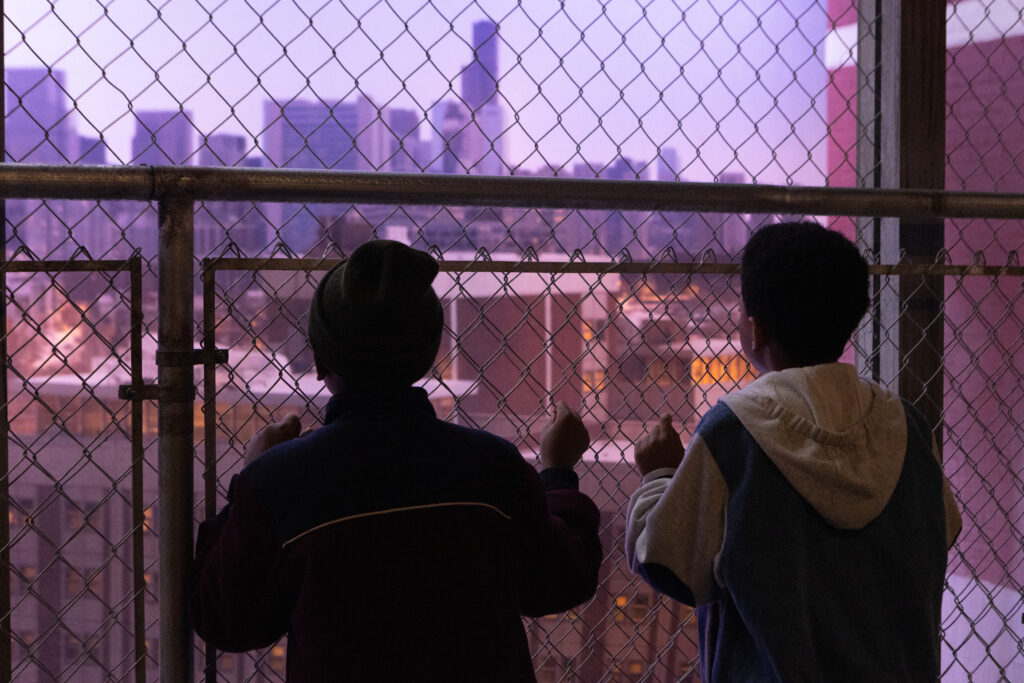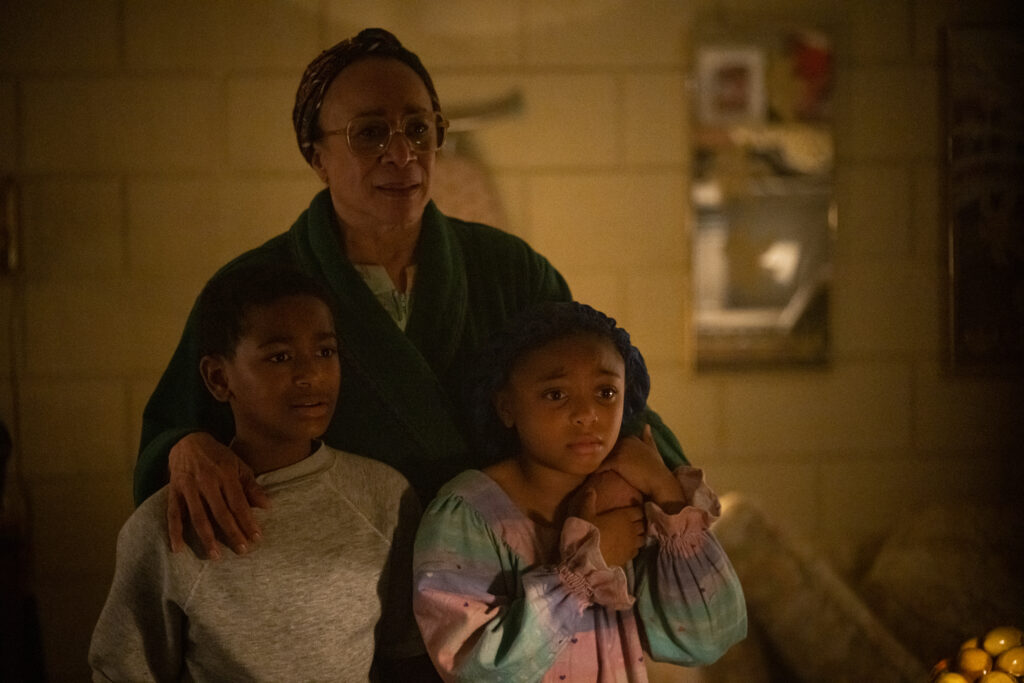AFI Fest, Avery Holliday, Blake Cameron James, Chicago, drama, film festivals, Gian Knight Ramirez, Giovani Chambers, Jurnee Smollett, Lil Rel Howery, Madisyn Barnes, movies, reviews, S. Epatha Merkerson, TIFF, Toronto International Film Festival, We Grown Now
April 28, 2024
by Carla Hay

Directed by Minhal Baig
Culture Representation: Taking place in Chicago, in the autumn of 1992, the dramatic film “We Grown Now” features a predominantly African American cast of characters (with a few white people and Latin people) representing the working-class and middle-class.
Culture Clash: Two 10-year-old boys, who are lifelong best friends in Chicago’s Cabrini-Green housing projects, have their friendship tested during a time when their crime-ridden neighborhood has become increasingly dangerous.
Culture Audience: “We Grown Now” will appeal primarily to people who are interested in emotionally authentic movies about childhood relationships in challenging circumstances.

Artistically made and emotionally moving, “We Grown Now” avoids many of the cringeworthy traps of African American struggle dramas. The beautiful and brotherly friendship between two boys in 1992 Chicago are the heart and soul of the movie. “We Grown Now” has some stereotypes that have been seen before in many other films about people who live in low-income housing projects, but these stereotypes are not demeaning because the movie shows the reality that most people who are in these circumstances are not criminals.
Written and directed by Minhal Baig, “We Grown Now” had its world premiere at the 2023 Toronto International Film Festival and screened at other festivals that year, including the Chicago International Film Festival and AFI Fest. The movie received three nominations at the 2024 Film Independent Spirit Awards: Best Feature, Best Cinematography and Best Editing. Baig is originally from Chicago. She did extensive research about the Cabrini-Green Homes housing project (usually referred to as just Cabrini-Green), where the main characters in “We Grown Now” live.
“We Grown Now” (which takes place in the autumn of 1992) is centered on two 10-year-old boys, who have known each other their entire lives and have both been raised their entire lives in Chicago’s Cabrini-Geen. Cabrini-Green was a group of government-funded apartment complexes built from 1941 and 1962, in order to provide affordable and safe housing to low-income people. About 15,000 people lived in Cabrini-Green during its peak residency. Cabrini-Green was demolished from 1995 to 2011 and became a mixed-used development property for businesses and residences.
In 1992, Cabrini-Green had become a dangerous place to live because of the high rate of crimes, but many of the residents couldn’t afford to live anywhere else in Chicago. That’s the situation with the immediate families for Malik (played by Blake Cameron James) and Eric (played by Gian Knight Ramirez), who are classmates in the same public school. Malik is the more outgoing, confident and academically talented of the two pals. Eric is introverted, sensitive and is comfortable with Malik taking the lead in many of their activities.
Malik lives with his divorced mother Dolores (played by Jurnee Smollett); his talkative younger sister Diana (played Madisyn Barnes); and Dolores’ widowed mother Anita (played by S. Epatha Merkerson), who shares stories with her grandchildren about the family’s history. Eric lives with his widowed father Jason (played by Lil Rel Howery) and Eric’s older sister Amber (played by Avery Holliday), who’s in her late teens or early 20s.
Dolores doesn’t like to talk about her ex-husband, who is not involved in raising Malik and Diana. The movie never shows or explains what caused the divorce and why this ex-husband is an absentee father. However, there’s a great scene in the movie that reveals how Malik still thinks about his father.
Malik’s household is religious, while Eric’s household is not. This difference is apparent when Malik and have a discussion about whether or not there’s life after death. Eric believes that death is final. Malik thinks that there could be truth in the concept of an afterlife. Malik also believes that the afterlife can include rewards or consequences for how people lived before they died.
Malik and Eric (who are being raised by good people in loving households) are typical children who like to have fun. They are both big fans of the Chicago Bulls and naturally admire Michael Jordan, who was known for his high-jumping style of playing basketball. When Eric and Malik are on playgrounds, one of the things that Malik and Eric like to do is play games to see who can jump the highest.
Malik says in a voiceover near the beginning of the movie: “In Cabrini-Green, there’s only one rule on the playground: It don’t matter how old you are, how much money you got, how big or tall or small. All that matters is if you can jump.”
In school, Malik is more likely to speak up in classroom sessions. He is intelligent and curious. Eric and Malik are good kids overall, but they are occasionally a little bratty. For example, they have a classmate friend nicknamed Slug (played Giovani Chambers), whose real name is Samuel but who prefers to be called Tyrone. Eric and Malik sometimes tease Slug over little things, such as his real name.
Something that Malik and Eric like to do, which is shown more than once in the film, is they when they are outside in open spaces, they shout, “I exist! We exist!” Sometimes, they make these statements when no one else is there. Sometimes, they say these things so people can hear them.
One day, the atmosphere at the school suddenly changes when the news spreads about Dantrell Davis, a 7-year-old boy from Cabrini-Green, who was killed by gun violence while walking to school with his mother. (“We Grown Now” brings this real-life tragedy into the movie.) Davis was the unfortunate victim of gunshots fired by a gang member who intended the bullets for a rival gang member. As a result of this tragedy, the school where Eric and Malik attend begins requiring all students to have ID cards in order to enter the school property.
It’s under these tension-filled circumstances that Dolores (who works in the payroll department at an unnamed company) starts to re-think being stuck in a job where she can barely afford to pay her bills. Dolores feels like she’s overworked and underpaid. There’s an opportunity for her at the company to apply for a job promotion in a managerial position that would give her a higher salary.
However, Dolores confides in her mother Anita that she’s afraid to apply for the job because she’d be competing with people who have a college education—something that Dolores doesn’t have. Dolores also says she’s afraid that she might get fired if she indicates she wants to leave her current position for something better. There are racial implications to how Dolores is feeling because she mentions the company has almost no black people in managerial positions.
Anita is encouraging and supportive of all of her family members. Some of the most important parts of the movie are when Anita shares her advice and family stories. What Anita has to say isn’t always immediately appreciated in the moment but might be understood later. Anita and her husband Gordon, who died in 1987, took a big risk by leaving their families behind in Tupelo, Mississippi to start a new life in Chicago. Dolores has spent her entire life living in Cabrini-Green, just like Malik.
Malik shows signs that he’s more mature than a typical 10-year-old boy. When Malik and Eric play hooky from school one day, it’s Malik’s idea that they should spend the day at the Art Institute of Chicago. These scenes of Malik and Eric together or a joy to watch, whether the two friends are looking in respectful awe at some of the museum’s artwork, or mischievously speculating what an arguing couple are quarreling about from a distance.
However, this day of educational fun comes crashing down with the reality that Malik and Eric were missing for several hours without telling anyone else where they were. The fallout of this unapproved trip will have an impact on Malik and Eric. In Cabrini-Green, where kids often have to grow up fast, it’s still a reality for Malik and Eric and they are not adults who can go wherever they want, when they want.
In 1992, Cabrini-Green had also become a place where law enforcement officers could enter a home without a warrant and do a destructive search. One of the families in this story has this painful and humiliating experience when officers raid the household after midnight for no plausible reason. It’s a harsh lesson that the kids in the family learn.
However, “We Grown Now” falls short in showing how the realities of black families in America have to educate their kids about how they can be treated differently because of racism. The movie didn’t need to have any preachy or corny lectures. However, when one of the kids gets yelled at by a parent for skipping school for that a day trip to the museum, the parent mostly mentions safety issues and not the racism reality that black kids (especially black boys) have to fight a negative stereotype of being problematic troublemakers.
Another flaw in “We Grown Now” is that Eric’s father Jason is a fairly underdeveloped character. Jason would have a lot to teach his son as a black male growing up in America, but those conversations aren’t really shown in the movie. And whatever happened to Malik’s father remains a mystery. In other words, the black men in the movie don’t have as much importance as the black women.
Despite these shortcomings, “We Grown Now” is still worth watching for the compelling and charming performance by James, who absolutely shines in his role as Malik. James has a natural way of acting that makes everything Malik does entirely believable. He embodies the character instead of just reciting lines of dialogue. Smollett and Merkerson are also quite good in their roles, but they’ve played variations of these types of characters in other movies or TV shows.
“We Grown Now” is not a pity party for low-income people. It’s also not a stereotypical “warning” movie about “at risk” youth who need “saving” from do-gooders, who usually come from outside the community. At its core, “We Grown Now” is a poignant and effective story about the power of true friendships and learning not to take life and loved ones for granted.
Sony Pictures Classics released “We Grown Now” in select U.S. cinemas on April 19, 2024, with an expansion to more U.S. cinemas on April 26, 2024.
